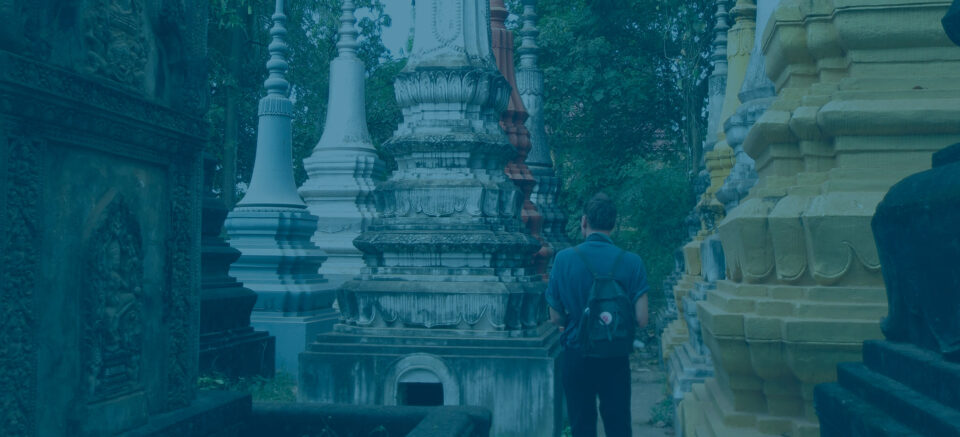
Religious Studies
Studying religion places you at the heart of the world’s most significant conversations.
Religious Studies explores deep questions and provides tools and perspectives that you can apply in myriad careers and pursuits
When studying religion at Macalester, you will tie together your politics, your social life, your family life, and your cosmic worldview—and community starts in the classroom. You will be asked to build bonds with your classmates and faculty members by discussing difficult issues with warmth and mutual respect. Our department is student-friendly: our major is flexible and not rigidly structured, so you can construct your studies in different ways. Throughout your academic career, you’ll learn how to be a savvy reader, writer, and thinker who can analyze complex texts and arguments, and connect to people across lines of difference.
At Macalester, we study the role of religion in history and society. Being religious, or following a particular faith, isn’t a requirement
In the Religious Studies Department
- Big, existential questions are encouraged and taken seriously
- We value religion as a tool for empathy and understanding other people
- Students can apply for the Roetzel Family Fellowship, an endowed fund that supports research in religious studies
- Students can learn about Islam’s rich cultural tradition from our new Islamic studies scholar
Religious Studies in the Cities
Our greater Twin Cities location provides many opportunities to explore diversity among and within religious traditions—from High Mass to rock-and-roll worship services, sacred dances, healing rituals, and divination. Students have conducted research in the community at Masjid An-Nur (Mosque of the Night) in Minneapolis and taken field trips to Watt Munisotaram, a Cambodian Buddhist Temple in Hampton, Minn., and the Hindu Temple of Minnesota in suburban Maple Grove. Plus, nearby institutions such as the Minnesota Historical Society and the University of Minnesota offer vital archives for research about religion.
Access to rich religious archives at the Minnesota Historical Society and the University of Minnesota
20+
Mosques near campus
Frequent field trips to places of worship, from temples to cathedrals
Life after Macalester
Religious Studies students do amazing and varied things. After Macalester, they have pursued careers in diverse fields (both religious and non-religious) such as public health, environmental law, engineering, medicine, communications, rabbinical school, and post-graduate study.
-
- City Year Los Angeles
- Copperworks Distilling Co.
- Elite Medical Scribes
- Fellowship of Christian Athletes
- Fraser Autism School
- Friends Committee On National Legislation
- John Ryan Performance, Inc
- Macalester College
- Minnesota Council of Churches
- Mmi_Montessori viet nam
- Naral Pro-Choice Washington
- New York County District Attorney’s Office
- Pacific Maritime Institute
- Peace Corps-Perú
- Planned Parenthood
- RECLAIM
- Science Museum of Minnesota
- SMA Home Delivery & Personal Shopping
- Sportvision
- TCS World Travel
- Teaching Assistant Program in France
- The Daniel Centers for Progressive Judaism (Beit Daniel)
- Twin Cities Habitat for Humanity
- Urban Adamah Jewish Community Farm
- Ventures
-
- Aarhus University
- Columbia University
- Duke University
- Harvard Divinity School
- Lewis and Clark College
- London School of Economics
- St. Catherine University
- University of Chicago Divinity School
- University of Minnesota
Join the community
From internationally known speakers at our annual Arnold H. Lowe Lecture Series, to informal “How is your week going?” conversations after class or in the hallway, our close-knit department offers events and activities for your professional and personal growth. At our monthly department Chai Times, you can sip our secret, custom (not-anything-remotely-like-Starbucks) Religious Studies chai (tea) and connect with your classmates and professors.
Department Links
Macalester Religious Studies Demands Justice for George Floyd
The Religious Studies department of Macalester College is grieving and incensed by the murder of George Floyd by members of the Minneapolis Police Department. We stand in solidarity with the protesters demanding justice, and add our names to those demanding both Minneapolis and Saint Paul enact substantive policies to control police violence in our cities.
These protests are responses not only to the murder of George Floyd, but to the generations of trauma inflicted on Black communities in the United States. This trauma is structural and not the result of just a “few bad cops.”
Minnesota’s racial disparities are among the very worst in USA, across nearly all categories. None of this is new, or unknown to those now feigning surprise in our political leadership. The brutal behavior of the police reflects the tacit approval of the state and elites.
While class matters, the police systematically target and attack Black people, Native people, and other people of color with excessive force and a wanton disregard for their lives. Now on streets throughout the USA, police are rioting and attacking peaceful protesters.
Those with power, influence and status, especially white people, have an obligation to speak up, act out, and hold policy-makers accountable. White people inherit the privileges of white supremacy; even anti-racist activities do not remove those unearned privileges. White people must use their privilege and their power to join the fight to make Black lives truly matter, to fight white supremacy, and to demilitarize and reduce the violent power of the police.
Macalester College is part of the Twin Cities and is neither innocent nor without responsibility. We are built on Dakota land, and have benefited from racists in our past, such as Rev. Neill. We call for our colleagues, our fellow departments, and the college as a whole to support the protests, and commit to challenging white supremacy and the violent forces of the police in our communities and in our everyday lives.